Contact


Mon - Fri, 9am - 6pm (EST)
Mon - Fri, 9am - 5pm (SGT)
Mon - Fri, 10:00am - 6:00pm (JST)
Mon - Fri, 9:30am - 5pm (GMT)
Mon - Fri, 9am - 6pm (EST)
Market Insights report

Artificial intelligence (AI) essentially refers to computing technologies that are inspired by the ways people use their brains and nervous systems to reason and make decisions, but typically they operate quite differently.
The current AI ecosystem consists of machine learning, robotics, and artificial neural networks (ANNs). In machine learning, programs learn from existing data and apply this knowledge to new data or use it to predict data.
What's included?
Artificial intelligence (AI) essentially refers to computing technologies that are inspired by the ways people use their brains and nervous systems to reason and make decisions, but typically they operate quite differently. The concept of AI has been the source of inspiration for many science fiction writers and futurologists for over a century. Today, advancements in computing and big data have made it a reality, with machines now being deployed at a large scale across industries. The application of AI technologies is driving growth at individual, business, and economic levels. In fact, AI has started to outperform human beings in a range of work activities, including ones requiring cognitive abilities.
The current AI ecosystem consists of machine learning, robotics, artificial neural networks (ANNs), and generative AI. In machine learning, programs learn from existing data and apply this knowledge to new data or use it to predict data. The field of robotics is concerned with developing and training robots. Usually, the ability of a robot to interact with people and the world follows general rules and is predictable. However, current efforts also revolve around using deep learning to train robots to manipulate situations and act with a certain degree of self-awareness. ANNs are built to mimic the workings of a human brain. NLP deals with the interpretation and manipulation of human language by computers.
Over the last few decades, the evolution of AI has mostly revolved around the advancement of linguistic, mathematical, and logical reasoning abilities. However, the next wave of AI advancements is pushing towards developing emotional intelligence. At the same time, sequential learning, another feature of Google’s DeepMind, is enabling AIs to learn multiple skills. Over the last few years, deep learning has made vast improvements in enabling machines to comprehend the physical world to a certain degree and is used across industries for various tasks. Among the leading economies, China has invested a lot of research and money into AI in recent years.
One of the major factors driving the current wave of AI growth is the strong interest of Venture Capital (VC) investment in AI start-ups. On the technology front, rapid advancements in computing power are driving the industry to the next level. Similarly, open-source platforms are promoting and enabling collaborative learning, which is conducive for the growth in AI. The current wave of growth in the AI industry is as much about the abundant availability of big data as it is about software and hardware. The amount of big data being generated by today’s increasingly digitized economy is growing at a rate of 40% each year and is expected to reach 163 trillion gigabytes by 2025.
This growth in big data is driving the improvement of AI algorithms. AI solutions are increasingly being customized to serve the needs of the automotive, healthcare, education, finance, entertainment, and other industries. In the automotive sector, AI is primarily used to power autonomous cars, with these systems expected to become standard in new vehicles in the medium to long term. In the healthcare industry, developments in the field of AI and machine learning have not only accelerated the pace of innovation in the industry but are also changing entire operating models. In the education industry, there are attempts to provide customized learning programs for each student using AI, while in the finance industry, AI wealth management solutions can offer higher personalization.
With the rise of AI, more and more start-ups venture into the market. Most work in the field of machine learning applications, followed by natural language processing. Heading into 2020, there were over 2,600 AI start-ups across 13 categories. AI companies globally have cumulatively raised around US$290.8 billion in funding during 2015-2023.
Over the last decade, the number of AI acquisitions grew steadily, only to dip for the first time in 2020, as the COVID-19 outbreak prompted many businesses to prioritize core operations over new acquisitions. However, the period after has witnessed renewed enthusiasm with the number of deals increasing to 312 in 2021, 263 in 2022, and 317 in 2023.
Companies from various industries are currently developing AI and related applications. Google, IBM and Microsoft are leading AI innovations in the IT industry, while Amazon and eBay are investing in AI to improve their eCommerce platform, and ride-sharing company Uber is using AI on autonomous driving, food deliveries, and mapping research. Collaborative development is on the rise, and leading companies such as Amazon, Apple, Facebook, Google/DeepMind, IBM, and Microsoft are currently working in partnership towards developing AI applications. The acquisition of small-scale AI companies by tech giants like Apple, IBM, and Microsoft in relevant fields is on the rise, leading to a decreasing learning curve. Other leading companies include Baidu, Facebook, and Salesforce.
Management Summary
Introduction
Introduction
We provide information on industries, companies, consumers, trends, countries, and politics, covering the latest and most important issues in a condensed format.



Mon - Fri, 9am - 6pm (EST)
Mon - Fri, 9am - 5pm (SGT)
Mon - Fri, 10:00am - 6:00pm (JST)
Mon - Fri, 9:30am - 5pm (GMT)
Mon - Fri, 9am - 6pm (EST)